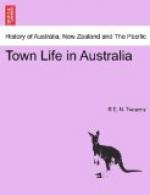Definite political parties there are none, except on the few occasions when a stirring question has temporarily divided the community. The spirit of the colony is thoroughly liberal, without being democratic in the narrow sense. In most important reforms—such as the withdrawal of State aid to religion; the registration of landed property; the acquiring of Constitutional Government, and the placing of the Constitution on a liberal basis; the introduction of the credit system for the purchase of small farms, and refusal to sell large tracts of country; and the adoption of State Education—South Australia has either led the way or been amongst the first. Thanks to the more advanced views of the earliest settlers, the abuses to be done away with have never been so flagrant as in the other provinces. Hence the work of reform has in every case been carried out in a more just and moderate spirit. The chief fault to be found in the political temper of the people lies in their apathy. When they do go to the poll, not a few of the electors prefer to vote for the candidate whom they believe to have the most honesty and public spirit, even if they do not happen to agree altogether with his political views. But the preference of men to measures is by no means an unmixed evil under the circumstances. A new country not only offers great facilities for political adventure, but rarely sins by going too slow, and when any policy of real import comes to the front, the evil corrects itself in proportion to the importance of the occasion. To this preference, also, it is due that, although South Australian politics are for the most part personal, yet the evils of personality are less prominent than in the sister colonies. Political consistency is rated higher, and the tone of the debates is infinitely better, than in New South Wales, where there is the same absence of important questions. Indeed, the Legislature is famed throughout Australia as being the most hard-working and best behaved.
With regard to Free Trade, a compromise has been adopted, and there are not wanting signs of a disposition to follow the example of New South Wales; but I fear this is rather out of dislike to Victoria than from any abstract recognition of the advantages of a Free Trade policy.
Warned by the troubles to which the question of Upper House reform gave rise in Victoria, the South Australians tackled it last session, when both Chambers were on the best of terms with each other, and an Act was passed by which the franchise was reduced from L50 freeholders and L20 leaseholders, to L20 leaseholders and L10 freeholders; the tenure of a seat shortened from twelve to nine years; the colony divided into electoral districts instead of voting in block; and a scheme introduced for finally dissolving the Council in the event of the occurrence of certain circumstances tending to produce a deadlock. All parties were agreed as to the general principles of the Act, and




